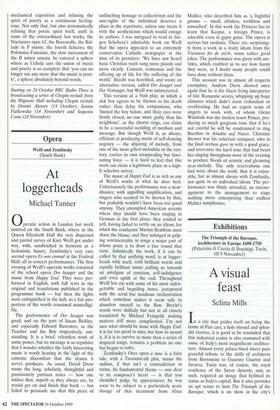Opera
Weill and Zemlinsky (South Bank)
At loggerheads
Michael Tanner
peratic action in London last week centred on the South Bank, where in the Queen Elizabeth Hall the very dispersed and partial survey of Kurt Weill got under way, with, sandwiched in between as a hedonistic luxury, Zemlinsky's very rare second opera Es war einmal at the Festival Hall; all in concert performances. The first evening of Weill's operatic works consisted of the school opera Der Jasager and the music from Happy End. They were per- formed in English, with full texts in the original and translations published in the programme book — but then the lights were extinguished in the hall, so a fair pro- portion of the words remained unintelligi- ble.
The performance of Der Jasager was good, and on the part of Susan Bicldey, and especially Edward Burrowes, as the Teacher and the Boy respectively, out- standing. It is a brief, relentless work of some power, but its message is so repulsive that I wonder whether the fairly interesting music is worth hearing in the light of the extreme discomfort that the drama it serves produces. As usual, David Drew wrote the long, scholarly, thoughtful and passionately partisan notes — how one wishes that, superb as they always are, he would get on and finish that book — but failed to persuade me that this piece of unflinching homage to collectivism and the non-rights of the individual deserves a place in the repertoire, unless one treats it with the aestheticism which would enrage its authors. I was intrigued to read in Jur- gen Schebera's admirable book on Weill that the opera appealed to an extremely conservative Catholic newspaper at the time of its premiere: 'We have not heard basic Christian truth sung more plainly and more clearly. Consent, consensus and the offering up of life for the suffering of the world.' Brecht was horrified, and wrote an alternative version, called Der Jasager und Der Neinsager, but Weill was uninterested.
This version of a Noh play, in which a sick boy agrees to be thrown to his death rather than delay his companions, who 'hurled the boy below, and their eyes were firmly closed, no one more guilty than his neighbour', as the chorus sings, can claim to be a successful wedding of medium and message. But though Weill is, as always, efficient at producing music of self-denying urgency — the abjuring of melody, from one of the most gifted melodists of the cen- tury, carries its own unappealing but fasci- nating force — it is hard to feel that this work can claim a legitimate place in a high- ly selective survey.
The music of Happy End is as rich as any of Weill's works at what he does best. Unfortunately the performance was a near- disaster, with appalling amplification, and singers who seemed to be thrown by that, but probably wouldn't have been too good anyway. They attempted American accents where they should have been singing in German in the first place; they tended to yell, having failed to settle on an idiom, for which the conductor Martyn Brabbins must share the blame; and they indulged in gulp- ing sentimentality in songs a major part of whose point is to draw a line round that state. Admittedly the work, if it can be called by that unifying word, is at logger- heads with itself, with brilliant words and equally brilliant music pulling us towards an amalgam of cynicism, self-indulgence and even uplift at the end. Throughout Weill lets rip with some of his most unfor- gettable and beguiling tunes, juxtaposed with the acrid but insidious orchestration which somehow makes it seem safe to abandon oneself to the flow. Brecht's words were skilfully but not at all closely translated by Michael Feingold, making matters still more complicated. I'm not sure what should be done with Happy End: it is far too good to miss, but how to mount it, if it is to survive as more than a series of inspired songs, remains a problem no one has begun to solve.
Zemlinsky's Once upon a time is a fairy tale, with a Turandot-ish plot, minus the sadism, if that isn't a contradiction in terms. Its fundamental theme — one dear to its composer's heart — is that you shouldn't judge by appearances; he was soon to be subject to a particularly acute dosage of that treatment from Alma Mahler, who described him as 'a frightful gnome — small, chinless, toothless and unwashed'. In this work the Princess has to learn that Kaspar, a foreign Prince, is adorable even in gypsy guise. The opera is serious but sardonic. There are, surprising- ly from a work in a fruity idiom from the Viennese fin de siècle, some rather good jokes. The performance was given with sur- titles, which enabled us to see how funny they were, as I doubt many people could have done without them.
This account was in almost all respects exemplary. Andrew Davis showed once again that he is the finest living interpreter of late Romantic scores, whipping up huge climaxes which didn't seem redundant or overbearing. He had an expert team of singers to work with, of whom Glenn Winslade was the tireless tenor Prince, pro- ducing so much gorgeous tone that if he's not careful he will be condemned to sing Bacchus in Atiadne auf Naxos. Christine Brewer was his reluctant conquest, who in the final section gave in with a good grace, and overcame the hard tone that had beset her singing throughout most of the evening to produce floods of ecstatic and gleaming near-melody. The only reservations one had were about the work: that it is enjoy- able, but as almost always with Zemlinsky, not quite in an individual idiom. The per- formance was thinly attended, an encour- agement to the management to stage nothing more enterprising than endless Mahler symphonies.


















































































 Previous page
Previous page